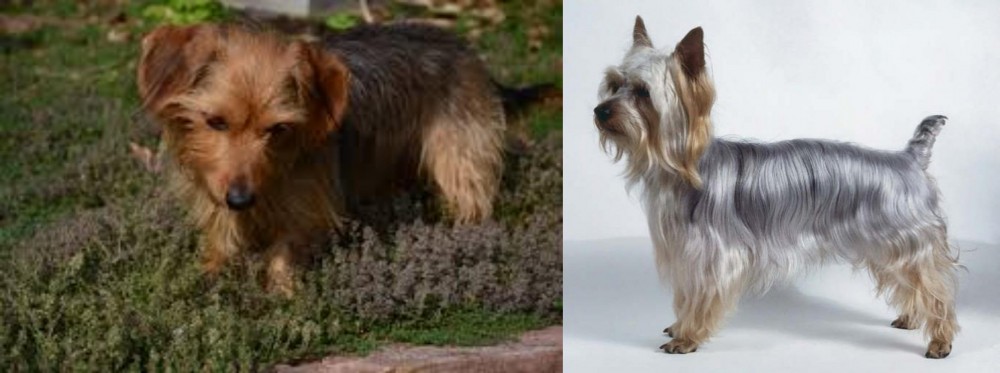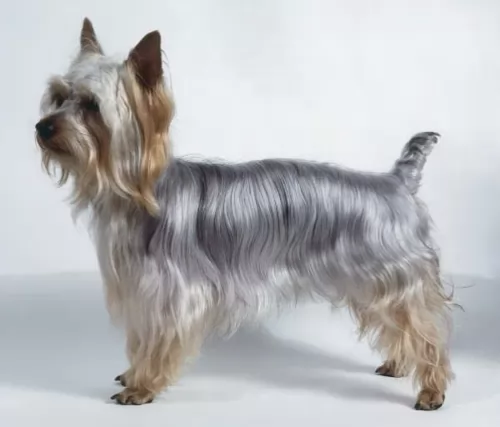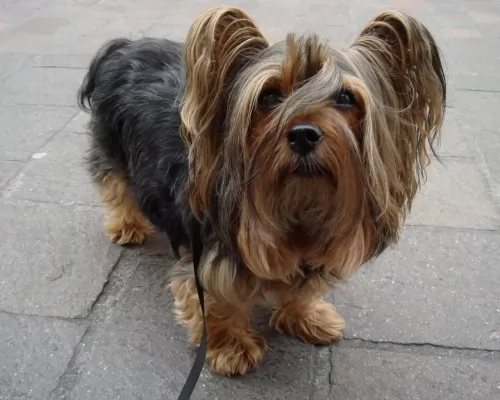 Petzlover
Petzlover Dorkie is originated from United States but Silky Terrier is originated from Australia. Both Dorkie and Silky Terrier are having almost same height. Both Dorkie and Silky Terrier are having almost same weight. Both Dorkie and Silky Terrier has almost same life span. Both Dorkie and Silky Terrier has same litter size. Dorkie requires Low Maintenance. But Silky Terrier requires Moderate Maintenance
Dorkie is originated from United States but Silky Terrier is originated from Australia. Both Dorkie and Silky Terrier are having almost same height. Both Dorkie and Silky Terrier are having almost same weight. Both Dorkie and Silky Terrier has almost same life span. Both Dorkie and Silky Terrier has same litter size. Dorkie requires Low Maintenance. But Silky Terrier requires Moderate Maintenance
 Dorkie Terriers originate from the United States of America. The small Dorkie, a cross between the Dachshund and the Yorkshire Terrier has a short history, unlike the two dog breeds that were bred to bring him about.
Dorkie Terriers originate from the United States of America. The small Dorkie, a cross between the Dachshund and the Yorkshire Terrier has a short history, unlike the two dog breeds that were bred to bring him about.
These dog breeds were both used for hunting small animals but the Dorkie today is essentially a companion dog. The International Designer Canine Association started recording registration of the Dorkie from 2009.
 It is the Yorkshire Terrier and the Australian Terrier which are the ancestors of the Australian Silky Terrier. This is by no means a new dog breed. It is believed that the breed came into existence at the end of the 19th century.
It is the Yorkshire Terrier and the Australian Terrier which are the ancestors of the Australian Silky Terrier. This is by no means a new dog breed. It is believed that the breed came into existence at the end of the 19th century.
The dog’s purpose is to be a companion. This little canine wasn’t always known as the Silky Terrier, but in 1955 the name became officially Silky Terrier.
The breed is also recognized by the Australia National Kennel Council in the Toy Group. In fact the breed is recognised by a number of the major kennel clubs as well as the Fédération Cynologique Internationale.
 The Dorkie is a small hybrid breed standing at 13 – 23cm in height and weighing 2 – 6kg. The Dorkie mostly comes with long, straight hair but there are however Dorkies who have the short hair of the Dachshund.
The Dorkie is a small hybrid breed standing at 13 – 23cm in height and weighing 2 – 6kg. The Dorkie mostly comes with long, straight hair but there are however Dorkies who have the short hair of the Dachshund.
The Dorkie is hypoallergenic, making them the ideal pet for allergy sufferers. They have floppy ears, a long body and short legs. The tail is long and furry. Most times they come in the Yorkshire Terrier colors of black and tan, but this can also vary.
The Dorkie is a loving, loyal, happy little dog who makes an excellent family dog. Although he isn’t looked upon as your typical lap dog, it is what he is really, as he loves nothing more than to be curling up on your lap or as close to you as he can get.
He loves spending time with his human family and is a social, extrovert kind of dog. Because he is also alert, he will do a good job of alerting his family to danger. He is good with children, but because of his smallness, rough children will need to be careful in rough and tumble games as he could get injured.
Even with a small dog like this, he will need training and socialization otherwise he can become a yapper, which comes from the Dachshund side. Training makes him obedient and relaxed around visitors in the home, and because he is an intelligent breed, he is easy to train and is a great dog for first time dog owners.
 This is a small dog breed, standing at just 21 to 26cm in height and weighing in the region of 4 to 5kg. He may be a toy dog, but he is robust and athletic.
This is a small dog breed, standing at just 21 to 26cm in height and weighing in the region of 4 to 5kg. He may be a toy dog, but he is robust and athletic.
The ears of the Silky are small and erect with a lot of silky hair that hangs down and the tail is preferably docked and held high.
His coat is eye-catching – straight, long, silky and shiny. If it is left unclipped, it will reach the floor. The colour of the coat is a tan and silvery grey.
The temperament of any dog is affected by things such as heredity, upbringing and the training and socialization he receives.
Small he may be, but the Silky Terrier can benefit from training as he is feisty and strong willed.
He is energetic and always ready for action. He is ready to come bounding after you and join his human family for any action they’re into. He is playful, bold, loyal, tenacious, independent, social and lively and he makes a good playmate for children.
He might tend to be a bit snappy and aggressive towards other dogs. He is also great as a watchdog, barking and alerting you to strangers.
 Dorkies are easy going little dogs and adapt easily to life in the city or in the country.
Dorkies are easy going little dogs and adapt easily to life in the city or in the country.
Ideally they are inside dogs, feeling happy and content around their human family. They love adults and children and will get on well with other pets in the home too.
They are quite active little dogs and will thrive on games inside the home or outside in the garden. He may be small, but you can put him on a leash and take him for walks.
They make excellent pets and are only too happy to become a devoted and loyal family member of yours.
 The silky terrier is a good choice for those who want a smallish dog but one which is robust and adventurous.
The silky terrier is a good choice for those who want a smallish dog but one which is robust and adventurous.
Your Silky is a loyal dog who loves spending time with his human family, wanting their companionship.
He will need to be physically and mentally stimulated as he is bright and intelligent. He can adapt to life in the city or the countryside but will need to be well exercised wherever he is.
 The Dorkie, being a cross-breed, is a healthy dog and with good care can live t be 10 – 13 years of age. Nonetheless he is still prone to genetic problems and he can inherit traits from both parents.
The Dorkie, being a cross-breed, is a healthy dog and with good care can live t be 10 – 13 years of age. Nonetheless he is still prone to genetic problems and he can inherit traits from both parents.
A healthy diet will be needed to maintain the Dorkie’s health. You don’t want to overfeed your Dorkie, more so because he is a small dog.
The way you feed a dog can have a massive impact on his health and longevity. Just remember that a dog that is obese will battle to exercise, but also obesity can result in serious health problems, putting strain on the bones and joints too.
You don’t want to feed your dog day after day with kibble, and adding in some cooked rice, vegetables and chicken can just give him a more varied diet. Raw meat can also be included from time to time. Always ensure that there is fresh, cool water available to him.
The most common symptoms of an allergy is skin irritation – your pet will be constantly scratching and licking. Some skin conditions with your Dorkie can be cleared up quickly while some might be so severe as to require lifelong treatment.
 Just like most other dogs, the Silky Terrier isn’t likely to get sick easily, but he can still succumb to any one of the dog illnesses there are.
Just like most other dogs, the Silky Terrier isn’t likely to get sick easily, but he can still succumb to any one of the dog illnesses there are.
This is when your pet isn’t able to regulate blood sugar levels. Your dog will be drinking a lot more water than usual and also be urinating more often. The vet will explain to you a special diet for your pet and how the disease can be controlled with insulin.
This is a disease seen more often in smaller dogs like the Silky. It is caused by an obstruction in the airway and symptoms can include labored breathing and coughing. Your dog will need to be treated with anti-biotics and possibly surgery.
 What you feed your pet can play an important role in managing health and skin conditions. Speak to your vet about special quality dog foods that can help reduce skin conditions and other nasty reactions to common, unhealthy food ingredients.
What you feed your pet can play an important role in managing health and skin conditions. Speak to your vet about special quality dog foods that can help reduce skin conditions and other nasty reactions to common, unhealthy food ingredients.
Dorkies are very low maintenance dogs, and they will require a brushing every 2 weeks. Those with longer coats may require some professional grooming. Check their teeth regularly and brush them 2 or 3 times a week. The occasional nail clipping may also be required.
 You can imagine that with that silky hair, you’re going to have to be brushing your furry friend quite a bit. It’s such soft, silky hair that it easily picks up burrs and gets matted. You may want to get your pet to a professional groomer to have the hair cut. As you brush him, check for any unusual lumps and keep an eye on his skin.
You can imagine that with that silky hair, you’re going to have to be brushing your furry friend quite a bit. It’s such soft, silky hair that it easily picks up burrs and gets matted. You may want to get your pet to a professional groomer to have the hair cut. As you brush him, check for any unusual lumps and keep an eye on his skin.
Check your pet’s teeth. Bad teeth can cause bacteria that can affect every part of your dog’s body. Check inside his ears for redness and check his eyes that there is no discharge. Trim the nails. If you don’t have the time or the inclination to do all these things for him, make an appointment with the professional pet groomers who will do it for you.
The Silky Terrier will need quality food if you want him to enjoy a long, healthy life. Its always a good idea to have some of the top quality commercially manufactured dog foods with you for convenience. If you want to give him the best there is, some home-made food will be a good choice, if you keep it simple.
Boiled chicken, brown rice or pasta and spinach, sweet potatoes and carrots are a healthy choice for your pet – plain and simple without any exotic spices that could upset his stomach. Your dog will lap it up and you will see how he loves it. Chop the home-made food up and add some of it into his dry kibble as a treat twice a week.